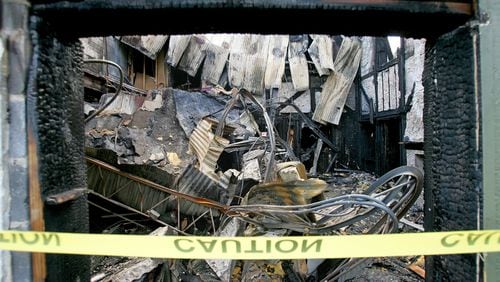Hearing that a terrorist had gunned down 50 people inside a gay nightclub in Orlando Sunday, bitter memories flared in Beverly McMahon.
Nearly two decades ago, she was on the receiving end of a terrorist's hate when her gay and lesbian nightclub in Atlanta was bombed. No one was killed but a handful of people were injured when the explosive containing nails erupted in a back room of the Otherside Lounge on Piedmont Road.
The bomb eventually blew McMahon out of business and left her for years with the sweats and shakes whenever an ambulance passed by. The Orlando massacre, she said, reminded her that the hate remains for gay and lesbian people, along with the threat of physical violence.
“I don’t think much has changed since my club was blown up,” she said.
Back then, Atlanta, perhaps more than any other place, was feeling the rising tide of terrorism. Three bombings occurred in seven months — the Centennial Olympic Park attack, along with bombings at her nightclub and a Sandy Springs abortion clinic. All were eventually linked to Eric Robert Rudolph, who pleaded guilty for all three and was sentenced to life in prison in 2005.
She sees a lot in common between Rudolph and the Islamic State, which claimed responsibility for the Orlando attack. The hate, the fanaticism, all cloaked in the mantle of religion.
“I always thought Rudolph was like ISIS,” McMahon said. “He comes from the same core.”
Her club was bombed the night of February 21, 1997, a Friday. She had just driven up to the place and was about to enter when what police later called “a projectile bomb” exploded. She was lucky in that the nails, glass shards and other debris flew over her head. The blast destroyed several cars in the parking lot, including her own. She remembers the sight of two empty baby seats blown out of her backseat.
“It could have been my kids,” she said.
At the time, she was determined to overcome the hate crime and re-opened in a week. But the crowds never really came back. The insurance paid a pittance. She and the other owner hung on for about two years before shuttering the place.
McMahon still lives in Atlanta. She works for a post traumatic stress center.
Cathy Woolard, a former Atlanta city council president who is running for mayor, had visited the Otherside Lounge from time to time. She was Georgia’s first openly gay elected official. She remembers the bombing.
“It was very scary and very threatening,” Woolard recalled. “And it just leaves an impression that violence is just around the corner.”
For years after the Otherside bombing, Woolard collected data on hate crimes against the lesbian, gay, bisexual and transgender community.
“I think this is a moment in the country, like Charleston was a moment,” she said, referring to the gunning down last year of nine black church members in that city. “You really have to ask, as a country, what happens when hate rhetoric influences people who are vulnerable to doing something this awful.”
Anthony Michael Kreis is a legal scholar at the University of Georgia. But back in 1997, he was just a 12-year-old kid growing up in New Jersey and starting to feel that he was somehow different from a lot of the other boys. Still, he distinctly remembers the Atlanta nightclub bombing.
“It scared the bejesus out of me,” he said.
Later, it was among those things that made it tougher for him to come out about his homosexuality.
He does believe times have changed. More understanding, more tolerance, more support.
If anything, he believes the lesson from the Otherside bombing is one of resilience.
“The only thing a community can do after such horrific acts of violence is to be strong, to be resilient, to rebuild and continue their lives,” he said.
About the Author







